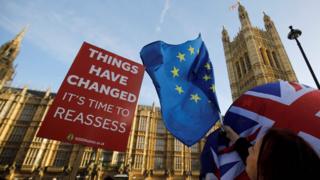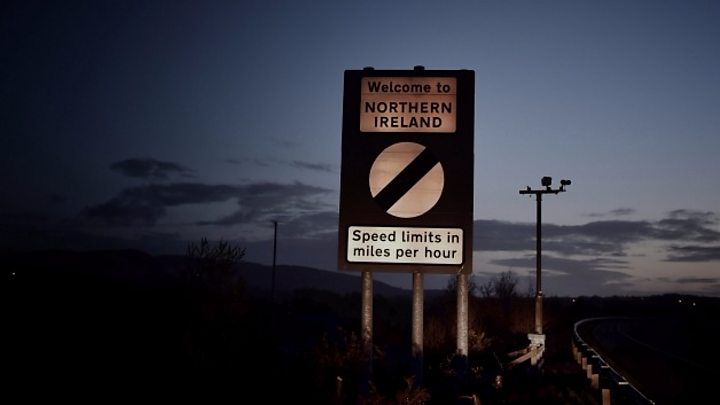Brexit: DUP says taking no deal off table not sensible
 Image copyright
AFP
Image copyright
AFP
Parliament voting to take a no-deal Brexit off the table would not be a "sensible way forward", a Democratic Unionist Party (DUP) MP has said.
Nigel Dodds said the very principle would "give leverage and power to the other side in the negotiation".
MPs are due to vote on a motion to rule out the UK leaving the EU with no deal in the Commons later.
It was promised because the prime minister lost a second vote on her Brexit deal in Parliament by 149 votes.
Addressing the Commons after losing the vote, Theresa May confirmed MPs would get a vote on whether the UK should leave without a deal on 29 March and, if that fails, on whether Brexit should be delayed.
How will the DUP vote later?
Mr Dodds, who is the DUP's Westminster leader, said it was likely his party would vote against the motion to rule out no deal.
"We don't believe as a general principle that taking no deal off the table is a sensible way forward," he told BBC Radio Ulster.
"We will wait and see what the terms of the motion are tonight.
"If it is one that takes no deal off the table forever that's a nonsense idea, because if you're going in to buy a car, or buy anything, you would never say to the person on the other side: "Whatever terms you offer me, I will take it and I will walk out.'
"The principle of taking no deal off the table is one that gives leverage and power" to the EU, he added.
Opposition to the government's Brexit plan focused on the backstop, the insurance policy to avoid a hard Irish border after Brexit in the event of a wider trade deal not being reached.
Although the prime minister said on Monday that she had secured legally binding changes to her deal, legal advice from Attorney General Geoffrey Cox said "the legal risk remains unchanged" that the UK would have no legal means of leaving the backstop without EU agreement.
For that reason, the DUP said its 10 MPs would vote against the deal again, having opposed it in January when it was first voted on in Parliament.
What does no deal mean for the Irish border?
On Wednesday, the UK government published its contingency plan for the Irish border in a no-deal scenario.
It said there would be no checks or controls on the border, and that goods entering the Northern Ireland market from the Republic of Ireland would not face tariffs.
The UK government has always insisted it would not allow there to be any hardening of the Irish border, but until now it had not set out how it would ensure that in the event of no deal.
It said its new plan includes measures that mean there will not be any land border checks.
However, the Irish government has not said what it intends to do on its side of the border in a no-deal situation.
It is also committed to ensuring a hard border is avoided.
But the EU has an obligation to protect the integrity of its single market - goods coming in and out of it - and the Republic of Ireland, as an EU member state, may have to adhere to rules enforced by the EU that change the situation at the border.
Tánaiste (Irish deputy PM) Simon Coveney said the Republic of Ireland would respond to the UK government's latest proposals as "part of the EU27" and had an absolute commitment to avoiding a hard border.
"The crisis here all emanates from the British parliament being unable to give a clear signal to what they can support and ratify," he said.

Why is the Irish border the focus in all of this?
The UK is set to leave the EU on 29 March 2019 after voting to leave in 2016.
The UK and EU have been engaged in negotiations for two years, with the issue of the Irish border the sticking point.
Both sides committed to avoid a hard Irish border - the return of checks or physical infrastructure - along the 310-mile frontier between Northern Ireland and the Republic of Ireland.
They agreed to a backstop: an insurance policy to maintain an open border unless and until another solution is found.
But the DUP and other parties at Westminster argued that the backstop posed a risk to the integrity of the union by creating an "Irish Sea border", and secondly, that it tied the UK to EU rules indefinitely with no say in them.
But a majority of business and farming groups in Northern Ireland, as well as other political parties, had supported the backstop and the government's deal.
What could happen next?
Parliament will hold a further vote for Wednesday on whether the UK should leave without a deal.
If that no-deal option is rejected, MPs could get a vote on Thursday on whether to request a delay to Brexit from the EU.
The European Parliament's Brexit co-ordinator, Guy Verhofstadt said the Brexit process seemed to be "spinning out of control".